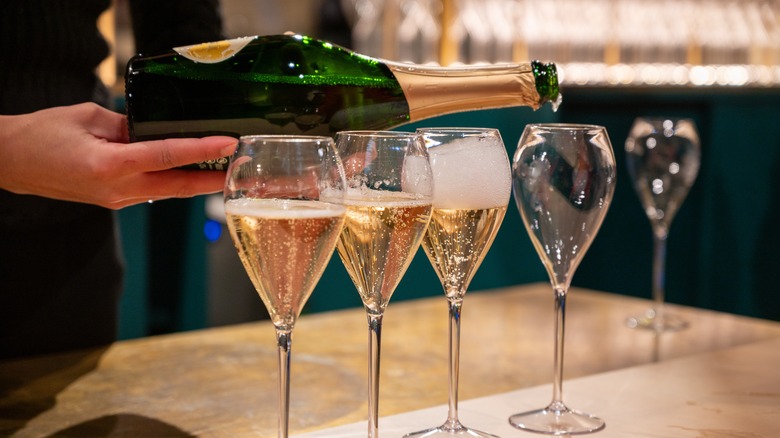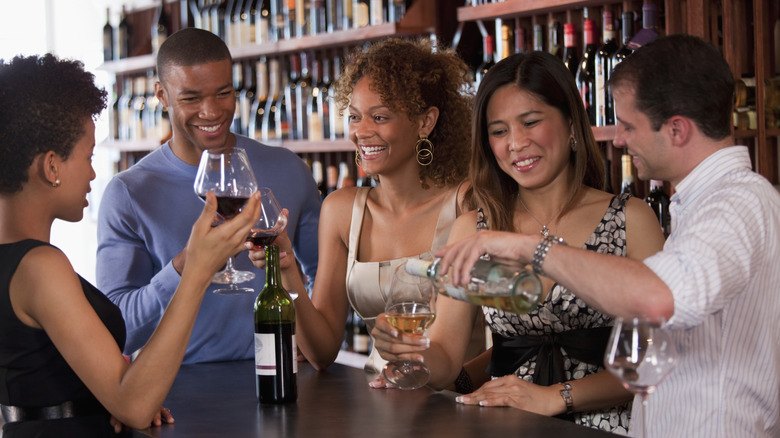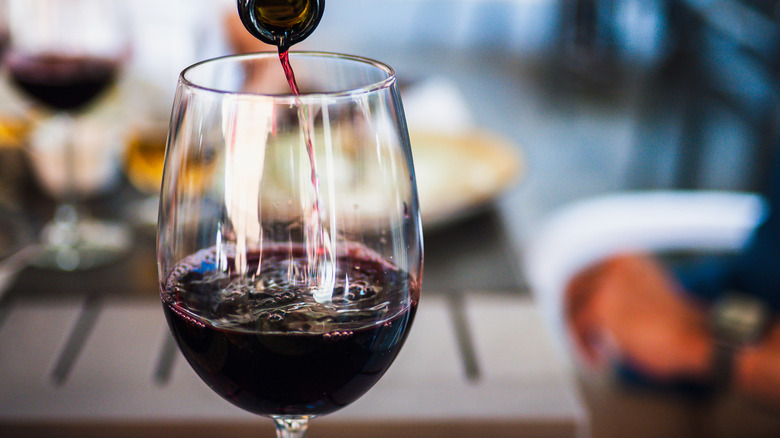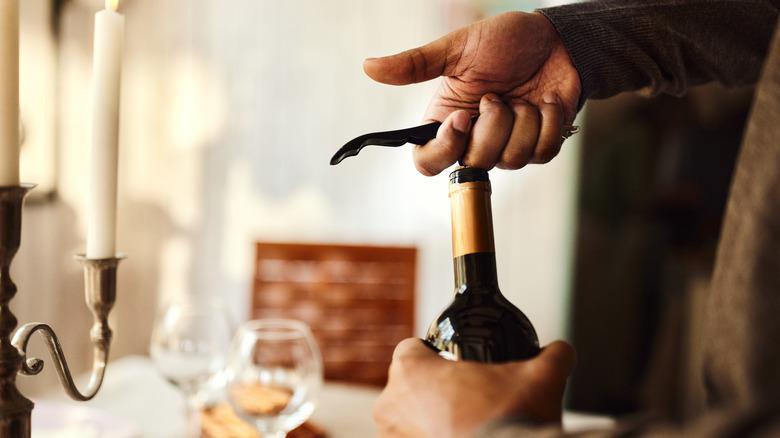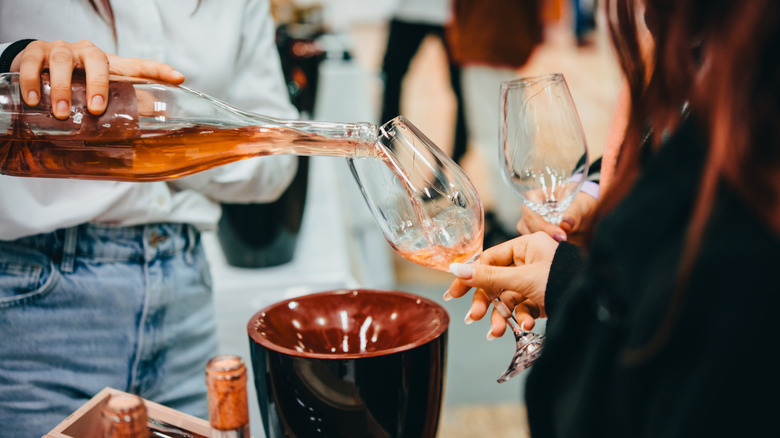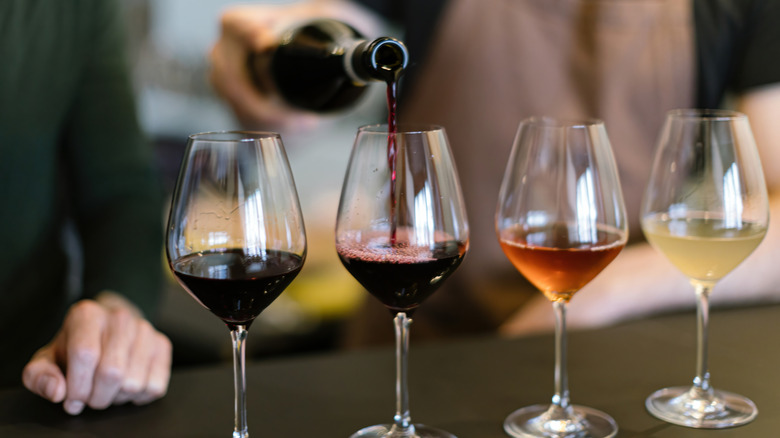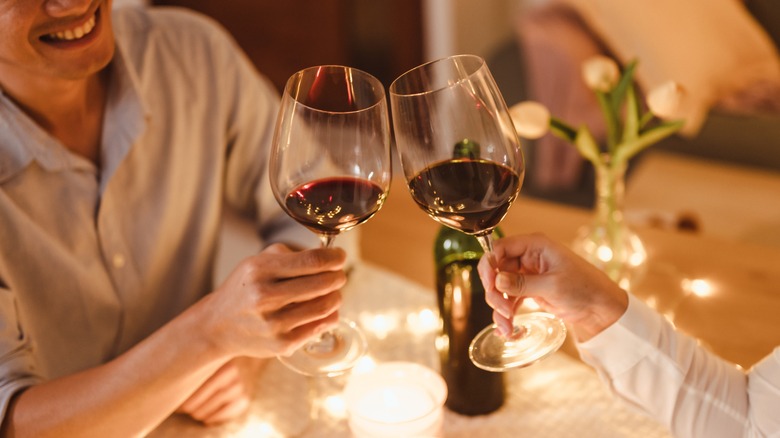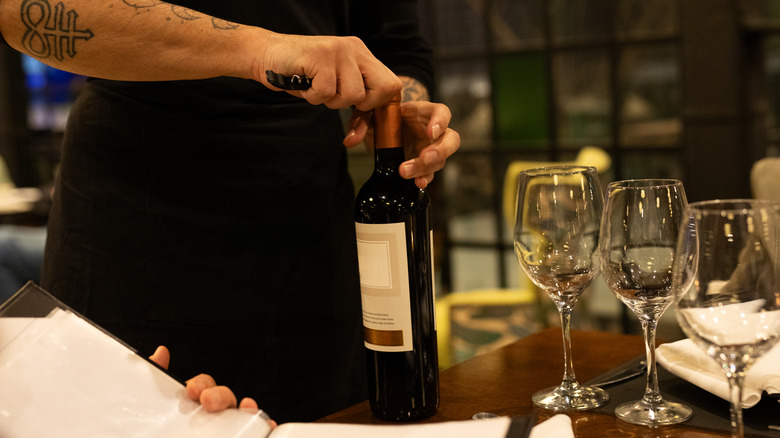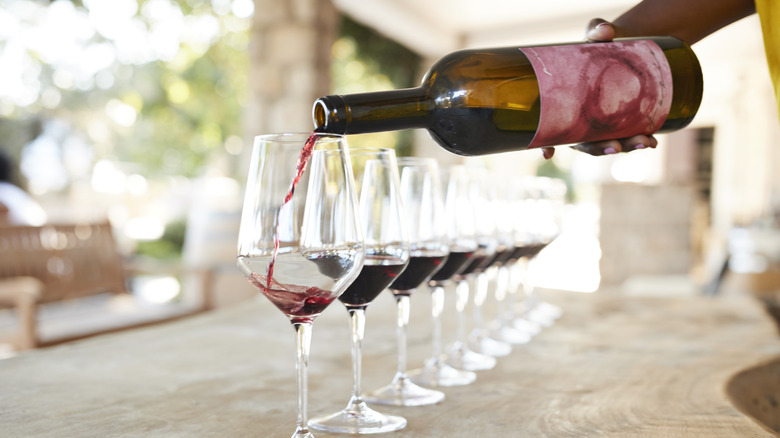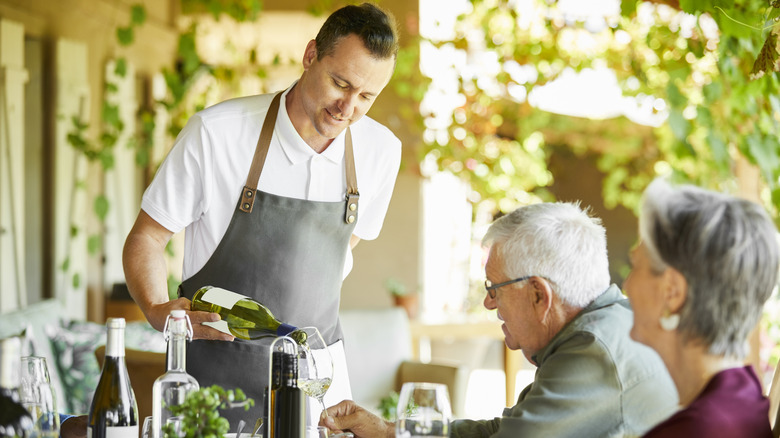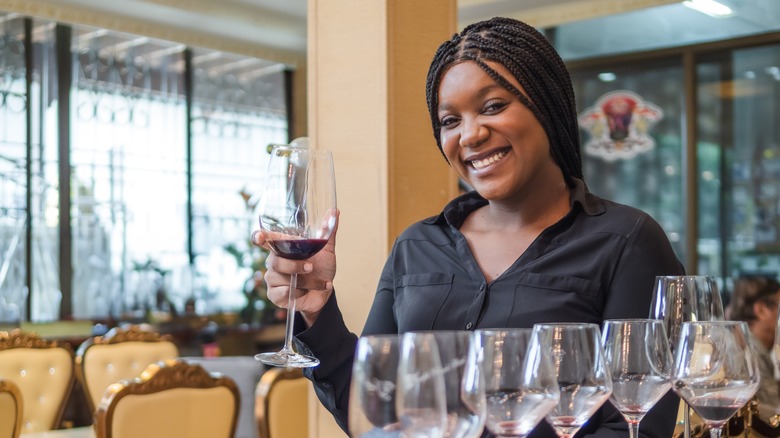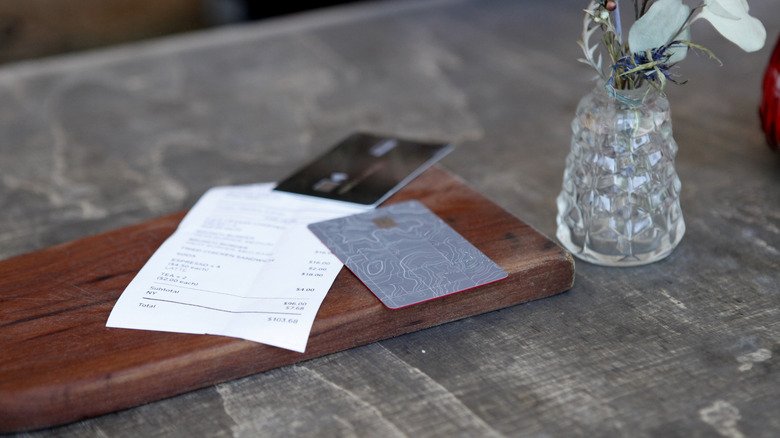12 Common Rude Behaviors To Avoid At A Wine Bar
We love opening up a bottle of wine at home to enjoy with dinner, but there's something about going to a wine bar that enhances the wine-drinking experience. Not only do you get to try a wider variety of wine than you might have the opportunity to at home, but you'll also benefit from the expertise of the employees who work there. What better way to learn more about wine ... or just have a fun date night? But as with any public space, there are certain rude behaviors you'll want to avoid when you go to a wine bar if you want to have the best possible experience (and not seriously annoy the hardworking staff at the place you're visiting).
Wine bar etiquette rules may be slightly different than those of, say, a nice restaurant or a whiskey bar, so as a WSET Level 3-certified wine writer, I've highlighted some of the most common rude behaviors you'll want to avoid the next time you go. By avoiding these behaviors, you'll ensure an easier time for the staff at the bar and guarantee a more pleasant tasting experience for yourself. But don't worry — you don't have to know anything about wine to follow proper rules of etiquette, and nobody is going to judge you if you don't swirl the wine in your glass. As long as you're polite and considerate, you're sure to be a star wine bar guest.
Being too loud or boisterous in a quieter, calmer atmosphere
Not all wine bars are created equally. Some offer louder, bustling environments with music playing and people dancing. At these kinds of places, it's probably okay to be on the louder side as you might in a different type of bar. But at other wine bars, the vibe might be quieter and more toned down. In those cases, you're going to want to avoid being louder and more boisterous than everyone else around you. After all, you don't want to disturb the couple next to you having a quiet night out or the group of extended family members looking for a simple, understated evening sipping wine.
Ultimately, it's all about being able to read the room. When you walk into a wine bar you're unfamiliar with for the first time, take a look around and try to pick up on what everyone else seems to be doing. Are people milling around, mingling with friends, and trying to talk over the blaring music? In that case, you can feel free to be a little looser. But if everyone is sitting down at the bar or table talking quietly with one another, try to keep your volume to a minimum. And if you're looking for a certain type of wine bar, it never hurts to do some research about the place before you actually show up.
Expecting your server to give you in-depth details about all the wine on the menu
When you go to a bar that specializes in wine, you can feel fairly confident that your server or sommelier is going to be able to give you more in-depth information about the wine you're ordering than at, say, a chain restaurant. This is part of the appeal of going to a wine bar specifically, after all. But that doesn't mean that your server or sommelier is going to have time to give you a ton of information about every single wine on the menu, and it's not fair for you to expect them to do so when they're working with other tables as well.
Your best bet is to either tell them what you generally like in a wine or to ask about a few specific wines. Feel free to ask about comparisons between a couple of different bottles — just don't expect them to go down the entire wine list when you don't provide them with any guidance about what you want to drink in the first place.
Moving your glass toward your server while they're pouring your wine
Have you ever had this experience? You've ordered your bottle of wine, and you're excited to take that first, refreshing sip. When the server opens the bottle and heads toward your glass to start pouring it for you, you move the glass toward them, attempting to make it easier for them. This action isn't necessarily rude, per se, but it makes it a lot easier for your server to spill, which is why you'll want to avoid doing it. When you see the server heading toward your glass with the bottle, just keep your glass in place so they don't have to adjust to avoid making a mess.
Honestly, this probably isn't going to make your server think you're rude — it just makes their job a little bit harder. Keeping this guidance in mind can prevent messy spills at the table and might even prevent mild annoyance from your server.
Bringing your own bottle without asking about corkage fees
Ever wanted to bring your own bottle to a wine bar? In general, it's not encouraged. After all, if you're going to a wine bar specifically, it probably has plenty of good bottles to choose from in the first place, negating the whole point of bringing your own bottle. But if you have a specific bottle you're really excited about drinking and you absolutely feel the need to bring it to the bar, you'll want to call ahead of time to ask about corkage fees. These are fees that you'll pay when you decide to bring your own bottle, and they pay for both the service and the use of the restaurant's bottle openers and glassware. They also help cover the cost of the money that the bar is losing by having you bring your own bottle instead of buying one of theirs. These fees will vary depending on the kind of spot you're at, with higher-end bars generally charging more than their less-pricey counterparts.
It's also generally appropriate to ask the sommelier or server who's helping you if they want to taste the wine. They generally won't pour a full glass but will rather simply take a sip of the wine from a clean glass. This especially applies if you're opening a particularly nice bottle.
Asking to have the corkage fee waived
There are some cases in which a corkage fee might be waived, but the majority of the time, this is a cost you're going to have to shoulder. And if a restaurant quotes you for a corkage fee, it's rude to ask to have it waived. Sure, it can be annoying to have to pay an extra fee when you're bringing your own booze, but think about it: You're using the restaurant's space, and by not actually spending money on a bottle, you're essentially costing the business money. You are not a guest at someone's house — you're visiting a business that's trying to make money. It's completely reasonable for a bar to charge this fee for your use of their space.
Absolutely don't want to pay that corkage fee? No worries! Either choose a bottle from the bar's menu or simply enjoy the bottle you want to drink at home or at a friend's house. That way, you can avoid the rudeness of asking for the corkage fee to be waived (and save some money in the process).
Acting pretentious about your wine knowledge
If you've been learning about wine, it can be tempting to show off all the knowledge you've been gaining. And while you can subtly flex your wine knowledge while you're asking your sommelier questions if you feel so inclined, it's generally for the best that you don't act pretentious about your wine knowledge — even if you think (or even know) that you know more about wine than the person serving you. Why? Well, to start, it's just not nice. In most situations, humility is the best option if you want to avoid hurting anyone's feelings.
But if you're at a wine bar and you yourself are not a wine industry professional, there's a good chance that the sommelier serving you actually does know a lot more about wine than you do. Sommeliers and wine experts study for years to gain the knowledge and skills they have — and even they know that there's always more to learn. Acting pretentious isn't likely to gain you any friends ... and may even earn you an eye roll or two.
Pouring wine into your own glass before serving others at your table
Treating your sommelier or server well is an important part of preventing rude behavior at a wine bar, but you'll want to make sure that you're treating your fellow diners or drinkers well too. One rude behavior that's always a good idea to avoid when you're at a wine bar (or anywhere wine is served, really) is pouring wine from a wine bottle into your own glass before serving others at your table. It's good manners to pour (or at least offer to pour) some wine in their glass before filling up your own. This shows your generosity and will make your fellow drinkers feel more welcome at the table.
This is an important etiquette tip to remember on a date, of course, especially if you want to go out with the person again. But it's equally important when you're dining with family, friends, co-workers, or business associates. And if you run out of wine before you get to your own glass? That's a great excuse to order an extra bottle.
Asking for a different bottle because you don't like your first choice after tasting it
You know how when you order a bottle of wine, the server or sommelier will open the bottle in front of you and then pour a little taste for you to try before pouring full glasses? You may assume that little sip you're taking is all about making sure that you actually like the wine you ordered, but that assumption is incorrect. Rather, you're just making sure the wine doesn't have any faults. Faults can be tricky to pinpoint if you don't have a lot of experience, so generally, you'll want the most wine-savvy person at the table to taste for faults. If you really don't know what you're smelling or tasting for, you can ask your server or sommelier for help. The only time it's appropriate to return a wine is when you do detect a fault.
So, what if you simply don't like the wine you ordered? Unfortunately, it's not appropriate to return the bottle in this situation. After all, the wine bar or restaurant isn't going to be able to sell that bottle to anyone else, so it would simply go to waste, costing the business a whole bottle for no reason. Think about it: You can't return a bottle you buy at a wine shop if you don't like how it tastes, so why would you be able to do so at a wine bar?
Requesting too many samples from your server
Sometimes, when you're at a wine bar that has a particularly extensive BTG (by the glass) list, you may be able to ask for samples of certain wines. This can be particularly helpful if you're trying to choose between two different wines. Oftentimes, your server will actually ask you if you want to taste different samples to get a better idea of what you want to drink. And although sampling two or three wines is generally appropriate in these instances, it's not okay to keep asking for a ton of samples in the hopes that you can get a buzz before actually paying for a full glass.
Also, keep in mind that in some instances, you might not be able to get samples at all. If the wine bar is primarily selling whole bottles, your server is not likely to open one just to allow you to have a small taste. If you do want to taste a ton of different wines without committing to whole glasses of each one, you should keep an eye out for wine-tasting events in your area. These events, which are often ticketed, are all about exposing you to a wider variety of wines, which can help you get a better idea of what varieties and styles you like and dislike, making it easier to order when you do go out to a wine bar.
Making rude comments about the wine
You're not going to like every bottle of wine you ever try, and that's okay. Different types of wine appeal to different types of people, so for every wine you try and don't like, there's likely another out there that you're guaranteed to love. When you do come across a wine you don't particularly like at a wine bar, you don't have to make your distaste known. If you're just trying a sample, a simple "no thank you" will suffice. If you've already ordered the whole bottle, you'll know to pick something different next time. But actively complaining about the wine (if there's nothing technically wrong with it) or making outward displays of disgust is going to be considered rude in most contexts.
Don't make disparaging comments about the wine to the sommelier, server, or any other employee at the wine bar you're at unless they specifically ask if you like the wine or not. Sure, it's annoying to try a wine that you don't particularly like, but it's all a part of learning about wine varieties, styles, and producers so you can select better next time.
Assuming your server will know what you want without explaining what you like in a wine
When you go to a wine bar and you're looking for a specific flavor profile in a wine, it helps to have a general sense of what you like and dislike in a wine. Love white wines like sauvignon blanc? Tell your server or sommelier that, or explain to them that you like white wines with high acidity. Prefer darker, richer wines like cabernet sauvignon? Inform them that you're looking for a bold, tannic, full-bodied red. By providing them with a few hints, they can point you in the direction of a wine you're likely to enjoy.
What you shouldn't do, however, is simply assume that your server will automatically know what you're looking for in a wine if you don't have any adjectives to describe the type of wine you're looking for or the wines you generally prefer drinking. Before going to a wine bar, brush up on some of these descriptive terms ... or just be open to a somewhat random suggestion from your server.
Not tipping ... or not tipping enough
The absolute rudest behavior you can engage in when you go to a wine bar — or any other food or drink establishment, for that matter — is not tipping, or simply not tipping enough. Hospitality professionals in the United States, particularly if they're not salaried (and most are not), generally do not even make standard minimum wage apart from their tips. In fact, the federal minimum wage for tipped employees is just $2.13 an hour. This means that hospitality workers, including those who work at wine bars, are wholly dependent on the money they make from tips. This means that tipping is non-negotiable — it's not just for particularly good service. If you can't afford to tip, you can't afford to go out, period.
And don't think you can get away with 10% or 15%, either. Anything less than 20 percent is considered a bad tip, and you absolutely will be considered rude if you tip less than this. And remember: 20% is standard for any service, even if it isn't sparkling. If you get particularly good service, you should consider tipping even more. Is the hospitality pay structure in the United States broken? Arguably, yes. But it's not your server's fault, and they shouldn't be penalized for it.
